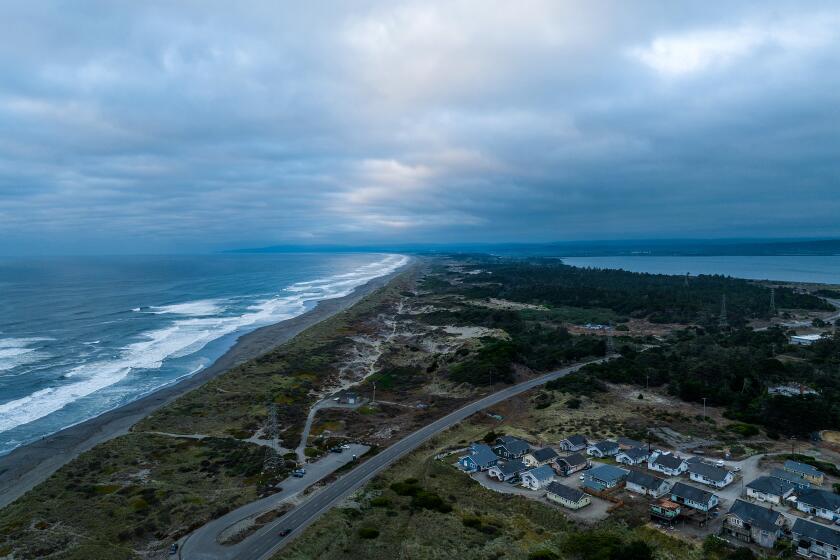Going With the Flow--Mandatory Rationing : Water: Voluntary programs are being dropped. Arcadia becomes the latest of more than 20 cities in L.A. County to make the cutbacks compulsory.
As Southern California’s drought enters its fifth year, cities in Los Angeles County are switching, one by one, from voluntary water rationing to mandatory measures.
More than 20 municipalities have mandatory controls in place, from steep surcharges for excessive consumption to citations from “water cops” for those who spray their driveways with garden hoses.
The latest to join the ranks is Arcadia. The City Council on Tuesday unanimously passed a mandatory conservation program requiring customers to cut back on water usage by 10%. The city will use a three-year average of usage between 1987 and 1990 for comparison with current consumption, city officials said.
Customers who repeatedly fail to comply can be charged up to four times the normal rate, they added.
Most voluntary programs have fallen far short of conservation goals, officials from all over the region said. “We only reached about a 3% reduction last year,” said Arcadia Water Manager Eldon Davidson.
But the driving force behind the imposition of mandatory controls has been the Metropolitan Water District, which supplies 27 water agencies between Ventura and San Diego counties. Last month, the MWD imposed a system of “incentives and disincentives,” amounting to stiff penalties for municipalities that fail to conserve.
Localities that exceed their allotments will have to pay triple the normal rate, said MWD spokesman Bob Muir.
For city water departments and local water suppliers, it’s a matter of disciplining customers now or paying the MWD later, Davidson said. Without mandatory penalties, Arcadia figured to owe $700,000 in surcharges by the end of the 1992 fiscal year, he said.
For the first time since 1977, the Los Angeles City Council is considering water rationing, including fines of up to 75% of the bill plus a $4 fee per excess billing unit (748 gallons) for those who exceed maximum quotas.
In West Covina, code enforcement officers are gearing up to hand out citations to those who violate a city ordinance against hosing down sidewalks and driveways. Other cities are considering installing flow restrictors or even shut-offs for water wasters.
The Commerce City Council on Tuesday approved a water conservation plan that requires residents to reduce water usage by 10% from last year.
Starting in March, the city will impose a 133% surcharge for those who exceed quotas. The local water company, California Water Service Co., also could restrict the amount of water pumped to customers who repeatedly use too much, city officials said.
The Santa Fe Springs City Council on Jan. 24 approved an ordinance that requires residents and businesses to reduce water usage by 10% from last year. The measure was effective immediately.
The water conservation ordinance levies a 10% surcharge against homes, businesses and industries that use excessive water.
Santa Fe Springs officials concede that the penalties will add up to only a couple of dollars every month for residents who violate the new law. But it is aimed at the city’s industries, which use 85% of the city’s water, officials said.
Like many other cities, Claremont has prohibited watering of lawns during daylight hours, except for new landscaping. Washing cars is prohibited unless hoses have shut-off nozzles. Washing down sidewalks and driveways is not allowed, and restaurants may serve water only at the request of customers.
In the South Bay, mandatory water conservation plans have been approved for Manhattan Beach and a private water company serving the Palos Verdes Peninsula, Hermosa Beach and Redondo Beach.
More to Read
Sign up for Essential California
The most important California stories and recommendations in your inbox every morning.
You may occasionally receive promotional content from the Los Angeles Times.









